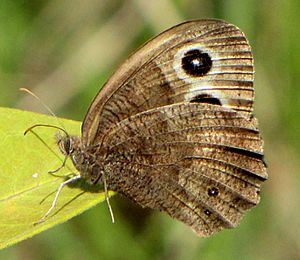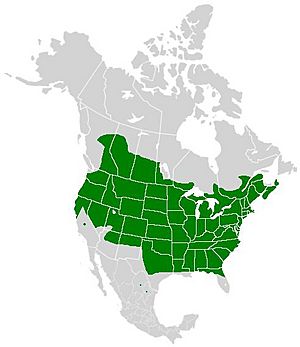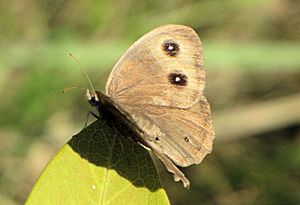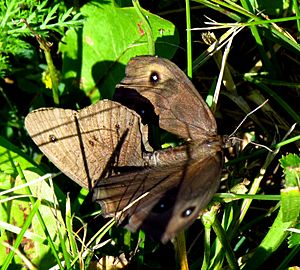Common wood-nymph facts for kids
Quick facts for kids Common wood-nymph |
|
|---|---|
 |
|
| Scientific classification |
|
| Kingdom: | Animalia |
| Phylum: | Arthropoda |
| Class: | Insecta |
| Order: | Lepidoptera |
| Family: | Nymphalidae |
| Genus: | Cercyonis |
| Species: |
C. pegala
|
| Binomial name | |
| Cercyonis pegala (Fabricius, 1775)
|
|
 |
|
| Script error: The function "autoWithCaption" does not exist. | |
Script error: No such module "Check for conflicting parameters".
The common wood-nymph (Cercyonis pegala) is a cool butterfly found all over North America. It belongs to a family of butterflies called Nymphalidae. People also call it the wood-nymph, grayling, blue-eyed grayling, or the goggle eye.
Contents
What Does It Look Like?
The common wood-nymph butterfly can look a bit different depending on where it lives. But they all share some features!
All of them are brown. They have two special eyespots on each of their front wings. The bottom eyespot is often bigger than the top one. Some butterflies might have many eyespots on their back wings, while others have just a few or none at all.
In the southeastern United States, these butterflies often have a big yellow patch on both sides of their front wings. But if you see them in the western or northeastern parts of their range, they might have a pale yellow patch or no yellow patch at all. If there's no yellow patch, you'll see two light yellow rings around the eyespots on their front wings.
These butterflies are pretty big, with a wingspan (how wide their wings are when spread out) of about 5.3 to 7.3 centimeters (2.1 to 2.9 inches).
Where Do They Live?
The common wood-nymph butterfly lives across a huge area! You can find them from Nova Scotia and Quebec in Canada, all the way west to northern British Columbia. They also live south through northern California, southeast to Texas, and east to northern Florida in the United States.
What Kind of Places Do They Like?
These butterflies like open spaces. You can often spot them in:
- Open woodlands and the edges of forests
- Fields and pastures
- Wet meadows and prairies
- Even salt marshes and savannas
When Can You See Them Flying?
The common wood-nymph usually flies from mid-May to early October in the eastern parts of its home range. If you're in California and Arizona, you'll see them flying from late June to early July. They usually have just one group of babies (called a brood) each year.
What Do Adult Butterflies Eat?
Adult common wood-nymphs enjoy eating different things. They drink nectar from flowers, sip tree sap, and even feed on decaying plants.
Some of their favorite flowers to get nectar from include:
- Asclepias tuberosa – also known as butterfly weed
- Cirsium arvense – Canada thistle
- Cirsium vulgare – bull thistle
- Daucus carota – wild carrot
- Dipsacus sylvestris - teasel
- Monarda fistulosa – wild bergamot
- Pycnanthemum virginianum – Virginia mountain mint
- Rudbeckia hirta – black-eyed susan
- Trifolium pratense – red clover
- Vernonia gigantea – tall ironweed
What is Their Life Cycle Like?
The female common wood-nymph is the one who flies around actively to find a mate. After mating, she lays her eggs on or near the plants her caterpillars will eat.
The eggs start out pale yellow, then turn tan with orange or pink spots. When the egg hatches, a tiny caterpillar comes out. This caterpillar doesn't build any shelters or nests. It's usually green or yellowish-green with darker green stripes along its body. It also has two short, pinkish bumps at the end of its tail. You might notice small yellow spots (called spiracles) on its sides and thin, white hairs all over its body. The caterpillar can grow up to 5 centimeters (2 inches) long!
When the caterpillar is ready, it turns into a chrysalis. This chrysalis is pale green with white or light yellow stripes. The very first stage of the caterpillar (called the first instar) spends the winter sleeping (hibernates).
What Do Caterpillars Eat?
The caterpillars of the common wood-nymph mostly eat different types of grasses. Here are some of the plants they like:
- Andropogon species – known as beard grasses
- Danthonia spicata – poverty oatgrass
- Poa pratensis – Kentucky bluegrass
- Schizachyrium species – bluestems
- Tridens flavus – purple top
Images for kids







